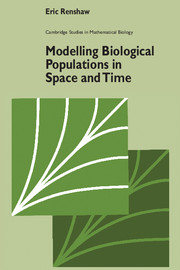Book contents
- Frontmatter
- Contents
- Dedication
- Preface
- A list of symbols and notation
- 1 Introductory remarks
- 2 Simple birth–death processes
- 3 General birth–death processes
- 4 Time-lag models of population growth
- 5 Competition processes
- 6 Predator–prey processes
- 7 Spatial predator–prey systems
- 8 Fluctuating environments
- 9 Spatial population dynamics
- 10 Epidemic processes
- 11 Linear and branching architectures
- References
- Author index
- Subject index
8 - Fluctuating environments
Published online by Cambridge University Press: 05 August 2012
- Frontmatter
- Contents
- Dedication
- Preface
- A list of symbols and notation
- 1 Introductory remarks
- 2 Simple birth–death processes
- 3 General birth–death processes
- 4 Time-lag models of population growth
- 5 Competition processes
- 6 Predator–prey processes
- 7 Spatial predator–prey systems
- 8 Fluctuating environments
- 9 Spatial population dynamics
- 10 Epidemic processes
- 11 Linear and branching architectures
- References
- Author index
- Subject index
Summary
The fascination of natural communities of plants and animals lies in their endless variety. Not only do no two places share identical histories, climates or topography, but also climate and other environmental factors are constantly fluctuating. Such systems will therefore not exhibit the crisp determinacy which characterizes so much of the physical sciences (May, 1974a). Now in the preceding chapters we have implicitly assumed that the environment is unvarying; birth and death rates, carrying capacities, etc., have all been held constant through time and space. Thus our stochastic models have involved variation in the sense that random events occur with probabilities which depend only on population size.
However, the most striking features of life on this planet are directly attributable to the diurnal rotation of the Earth and its annual journey around the Sun. Indeed, the behaviour and reproductive cycles of living organisms are closely adapted to the regular alternation of summer and winter, or of wet season and dry season (Skellam, 1967). So as real environments are themselves uncertain, all parameters which characterize populations must exhibit random or periodic fluctuations to at least some degree. Thus even deterministic equilibrium is not an absolute fixed state, but is instead a ‘fuzzy’ value around which the biological system fluctuates.
We have already seen in Section 4.8 that static environment blowfly models (for example) do not produce sufficient variability, and so by admitting the reality of environmental variation we have a second, powerful source of variability at our disposal.
- Type
- Chapter
- Information
- Modelling Biological Populations in Space and Time , pp. 223 - 257Publisher: Cambridge University PressPrint publication year: 1991

